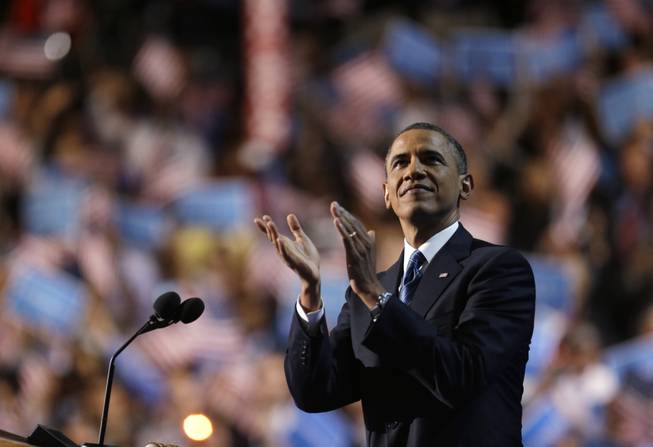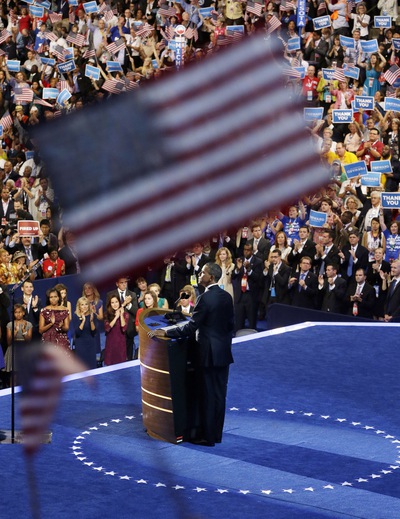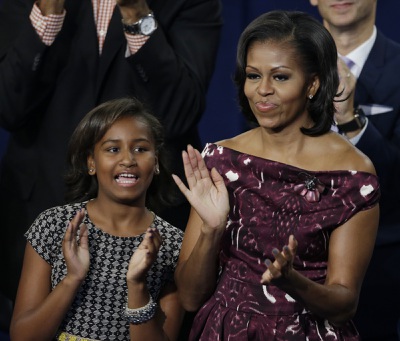
ASSOCIATED PRESS
President Barack Obama addresses the Democratic National Convention in Charlotte, N.C., on Thursday, Sept. 6, 2012.
Friday, Sept. 7, 2012 | 2 a.m.
CHARLOTTE, N.C. -- President Barack Obama addressed the country like brothers-in-arms Thursday night, urging voters to re-elect him to a second term with the assurance that “our problems can be solved” and “our challenges can be met.”
“I’m asking you to rally around a set of goals for your country,” Obama said. “Goals in manufacturing, energy, education, national security and the deficit; a real, achievable plan that will lead to new jobs, more opportunity and rebuild this economy on a stronger foundation.”
“Yes, our path is harder,” Obama said, “but it leads to a better place.”
That, in a nutshell, was Obama’s pitch for the next four years of his presidency.
Yet if he wins, there’s no guarantee he’ll have enough of a mandate to realize his plan.
Democrats will be the first to say that Republican obstructionism in Congress has been the greatest hurdle to an economic recovery.
“If the Republicans would get out of our way we would create some jobs,” said Harry Reid, the majority leader in the Senate.
But by the numbers, it looks like gridlock is going to be here to stay.
Even if Democrats are able to retain the Senate, they are likely to have a much smaller margin of leadership than their already paltry six-vote lead, which isn’t enough to circumvent blocks or avoid filibusters. There’s no polling to suggest that the House can be wrested away from Republican control in this election either.
“Those Republicans aren’t going to roll over and automatically give the agenda to the president,” said Terry Madonna, director of Franklin & Marshall College’s Center for Politics and Public Affairs. “That’s not going to happen.”
Obama’s advisers believe otherwise.
“After the president wins this election, the other side will have to stop their continual efforts to stop him from getting anything done,” said Jim Messina, director of Obama’s 2012 campaign. “Some of the fever will disappear as the other side understands there is a mandate to work together.”
“When the president wins and we hold the Senate, then the dynamic changes, the political environment changes,” said Pete Rouse, a counselor and former chief of staff to Obama in the White House. “The big issue here is that Republicans had a strategy of blocking the president’s agenda ... I don’t think that the Republicans in Congress will be able to continue their strategy of just blocking everything.”
Since the Republicans won a majority in the House and narrowed a wide Senate Democratic supermajority in the Tea Party-dominated election of 2010, Congress has been a difficult place to get anything done.
In the first two years of the Obama presidency, Congress and the White House aggressively knocked out legislation — a domestic agenda described by Democrats as the most comprehensive of any the country had seen since the Great Society years. They passed a stimulus bill, an auto industry bailout, pay equity legislation and a health care overhaul.
Obama recalled some of his successes in his convention speech Thursday.
“I’ve met workers in Detroit and Toledo who feared they’d never build another American car,” Obama said. “Today they can’t build them fast enough, because we reinvented a dying auto industry that’s back on top of the world.”
But he shied away from mentioning some of the more controversial achievements, referring obliquely to health care but uttering not a word in celebration of the Affordable Care Act, and steering clear of the word “stimulus” entirely.
After 2010, Obama’s productivity slowed as the climate in Congress changed.
Obama started off the second half of his presidency trying to work across the aisle. But his efforts to reach out to Republican leaders in Washington ran aground during the debt ceiling crisis of 2011, after his administration accused House Speaker John Boehner of breaking faith with him in negotiations to steer the country back from the brink of financial default.
By the end of 2011, he had shed his previous guise of conciliator-in-chief, directly and publicly blaming the Republican Party for holding up a deal on a payroll tax cut.
In Thursday night’s speech, he was openly ridiculing the Republicans’ fiscal position.
“Have a surplus? Try a tax cut. Deficit too high? Try another,” Obama said. “Feel a cold in the morning? Take two tax cuts, roll back some regulations, and call us in the morning.”
That applause line got laughs, and may even win him a few votes. But it isn’t likely to earn him any warm feelings from the Republicans he’ll still have to work with if he wins.
“Once a president hits his second term, he starts thinking more about his legacy. And in order to create and hold a legacy, you need to have accomplishments,” said Robert Uithoven, a Republican strategist based in Nevada. “To do that, you need to reach across the aisle. That’s something he hasn’t done in the last two years.”
But that is a decidedly Republican outlook on the gridlock in Washington.
“The Republican strategy, articulated by Mitch McConnell [the Republican leader in the Senate], was ‘our goal is to make him a one-term president,’” said Eric Herzik, political science professor at UNR, who is also a registered Republican.
But if Obama wins a second term, simply waiting it out with the same uncompromising attitude isn’t really an option, Herzik continued. “I don’t think the American people are going to be too accepting of that,” he said. “I think it’s pretty clear that the American people are going to say: ‘Get something done.’”
In his speech Thursday night, Obama seemed to have the goal of a mandate in mind as he strove to enlist the audience as partners in his re-election crusade.
“The election four years ago wasn’t about me. It was about you,” Obama said. “If you turn away now, if you buy into the cynicism that the change we fought for isn’t possible, well, change will not happen.
“We don’t turn back. We leave no one behind. We pull each other up. We draw strength from our victories, and we learn from our mistakes, but we keep our eyes fixed on that distant horizon,” he said.
In other words, vote in November, and then join me in the long term to change the rules of the game.
Obama’s advisers are convinced that if Obama is re-elected, he can compel others, even those who lately have been opposing him, to join him in advancing his agenda — at least on the big issues.
“I think Speaker Boehner would like to be his partner,” Rouse said. “That doesn’t mean that (Republicans) are going to (cross the aisle) and everything’s going to be straight right away. They’re tough negotiators, they have strong beliefs, they have strong philosophy. But I do think they will need to come to the table and say everything’s gotta be on the table for deficit reduction.”
“I do think the winner’s going to have a mandate,” said Robert Gibbs, senior adviser to Obama’s campaign. “Not to get everything done … but I think you have a mandate for understanding, for instance, that when Barack Obama wins, we have to then put aside the notion of we can’t raise taxes on people that make a million dollars.”
Their outlook may be overly optimistic.
“We’ve lost the bipartisan willingness to try middle ground. There’s nothing in this election so far that suggests it’s going to be changed dramatically in Washington,” said Fred Lokken, political science professor at Truckee Meadows Community College. “Unless something finally fixes our partisanship problem, neither (Obama nor Romney) are poised to be successful (as president).”
But if the Obama shop’s optimism sounds like the “hope and change” rhetoric Republicans have ridiculed as being unsuccessful, it’s for one reason: The president clearly hasn’t abandoned the idea.
“The times have changed — and so have I. I’m no longer just a candidate, I’m the president,” Obama said. “But as I stand here tonight, I have never been more hopeful about America.
“I’m hopeful because of you,” he continued. “Ours is a ‘future filled with hope.’ And if you share that faith with me — if you share that hope with me — I ask you tonight for your vote.”
Anjeanette Damon contributed to this story.



Join the Discussion:
Check this out for a full explanation of our conversion to the LiveFyre commenting system and instructions on how to sign up for an account.
Full comments policy